Unit 13 We're trying to save the earth! Section A Grammar Focus-4c课件
文档属性
| 名称 | Unit 13 We're trying to save the earth! Section A Grammar Focus-4c课件 |
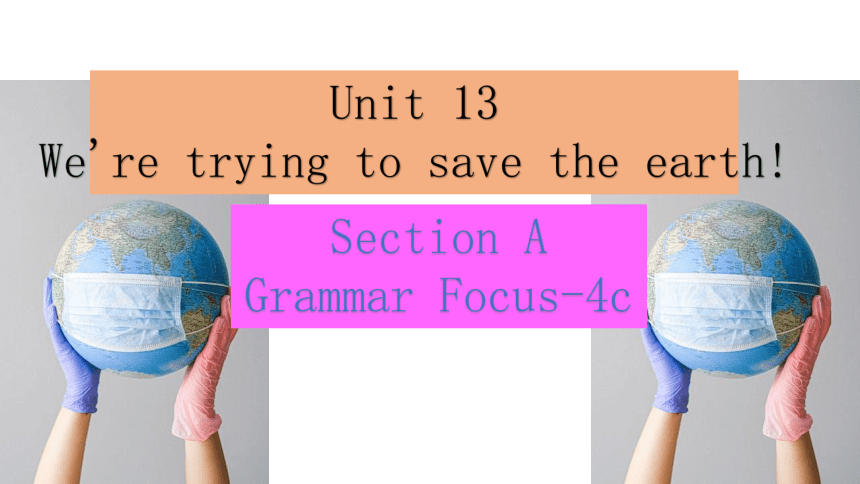
|
|
| 格式 | pptx | ||
| 文件大小 | 2.7MB | ||
| 资源类型 | 试卷 | ||
| 版本资源 | 人教新目标(Go for it)版 | ||
| 科目 | 英语 | ||
| 更新时间 | 2023-02-11 00:00:00 | ||
图片预览

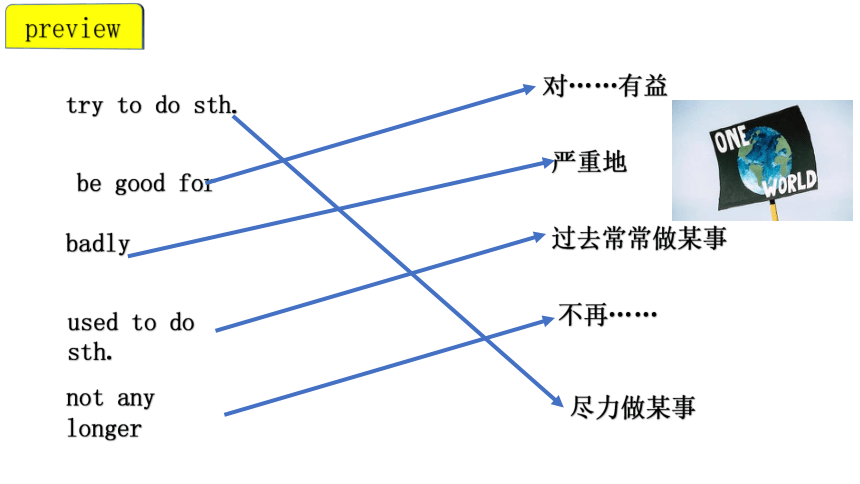
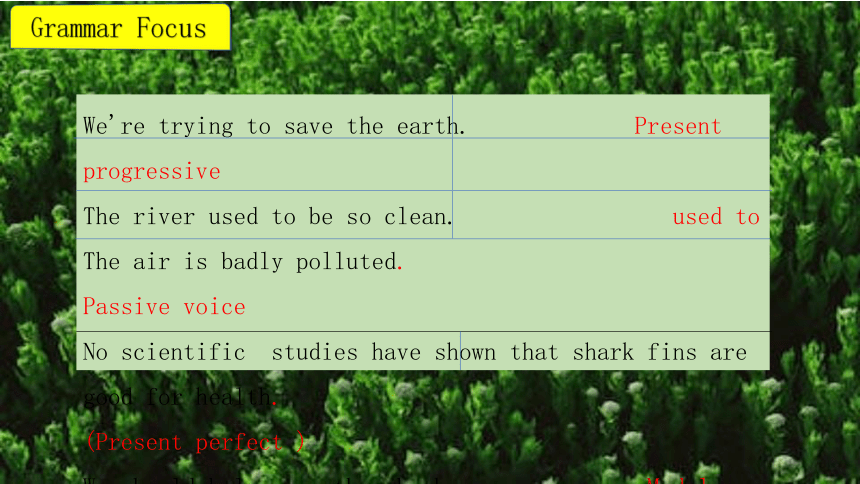
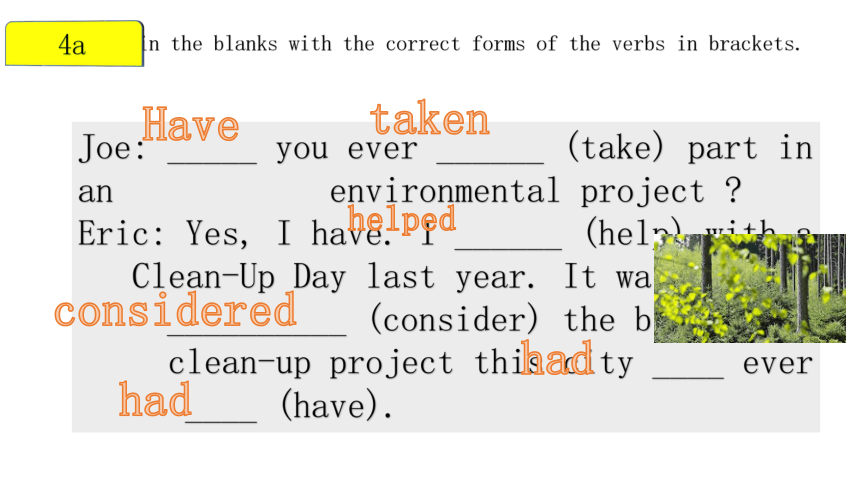
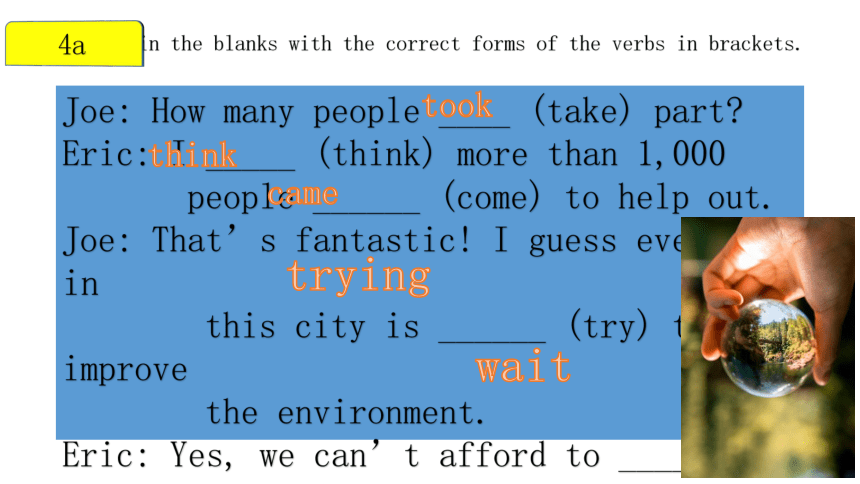
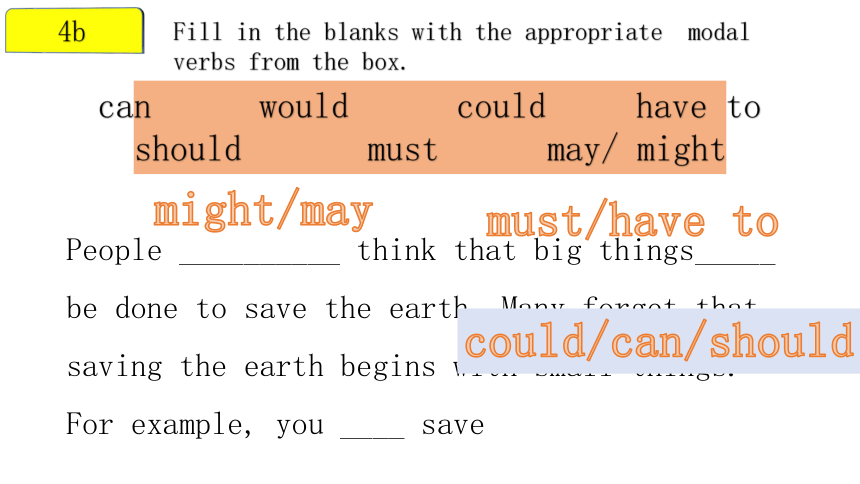
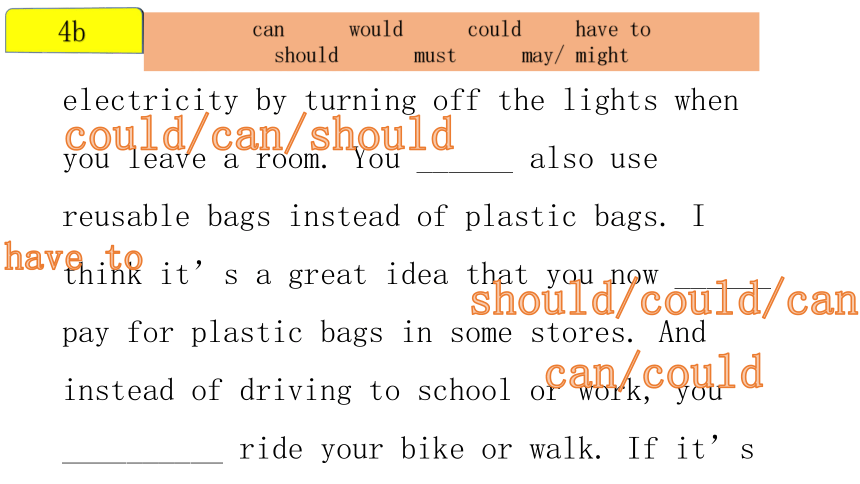
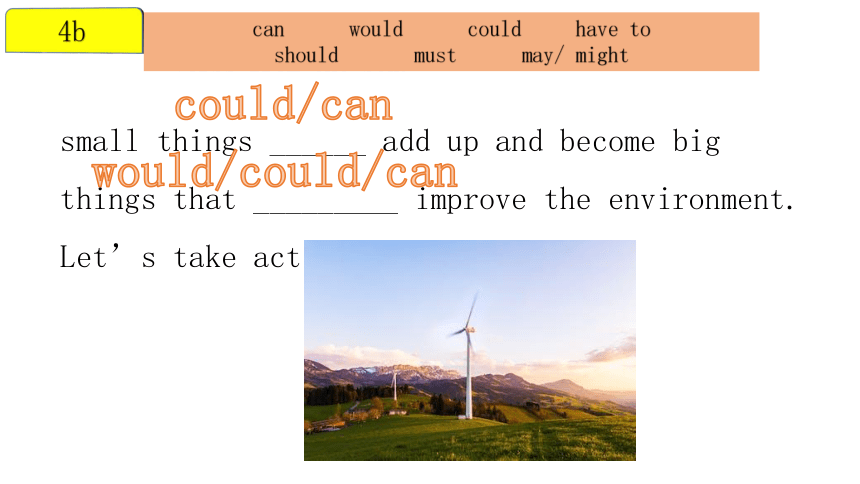
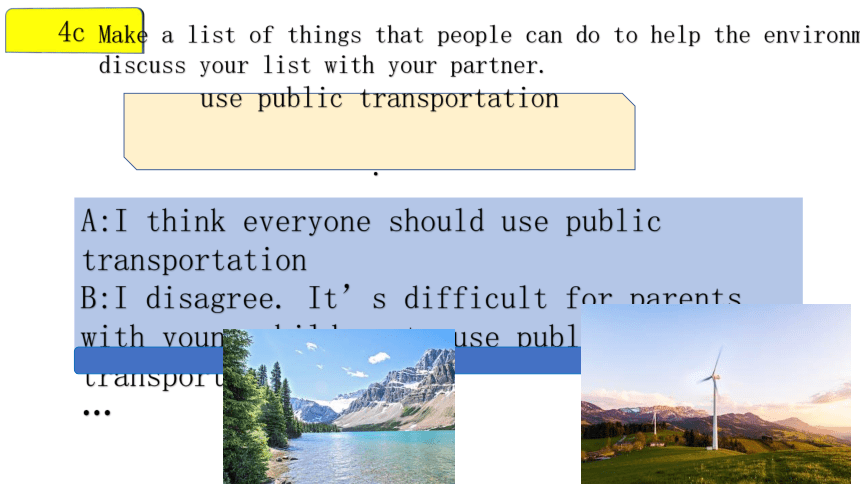
文档简介
(共21张PPT)
Unit 13
We're trying to save the earth!
Section A
Grammar Focus-4c
preview
try to do sth.
尽力做某事
badly
be good for
对……有益
严重地
used to do sth.
过去常常做某事
not any longer
不再……
Grammar Focus
We're trying to save the earth. Present progressive
The river used to be so clean. used to
The air is badly polluted. Passive voice
No scientific studies have shown that shark fins are good for health. (Present perfect )
We should help save the sharks. Modal verbs
Fill in the blanks with the correct forms of the verbs in brackets.
4a
Joe: _____ you ever ______ (take) part in an environmental project
Eric: Yes, I have. I ______ (help) with a
Clean-Up Day last year. It was
__________ (consider) the biggest
clean-up project this city ____ ever
____ (have).
Have
had
considered
helped
taken
had
Fill in the blanks with the correct forms of the verbs in brackets.
4a
Joe: How many people ____ (take) part
Eric: I _____ (think) more than 1,000
people ______ (come) to help out.
Joe: That’s fantastic! I guess everyone in
this city is ______ (try) to improve
the environment.
Eric: Yes, we can’t afford to ____ (wait)
any longer to take action!
think
wait
trying
came
took
4b
Fill in the blanks with the appropriate modal verbs from the box.
can would could have to
should must may/ might
People __________ think that big things_____ be done to save the earth. Many forget that saving the earth begins with small things. For example, you ____ save
might/may
could/can/should
must/have to
4b
Fill in the blanks with the appropriate modal verbs from the box.
can would could have to
should must may/ might
electricity by turning off the lights when you leave a room. You ______ also use reusable bags instead of plastic bags. I think it’s a great idea that you now ______ pay for plastic bags in some stores. And instead of driving to school or work, you __________ ride your bike or walk. If it’s far, you __________ take the bus. All these
could/can/should
should/could/can
have to
can/could
4b
Fill in the blanks with the appropriate modal verbs from the box.
can would could have to
should must may/ might
small things ______ add up and become big things that _________ improve the environment. Let’s take action now!
could/can
would/could/can
4c
Make a list of things that people can do to help the environment and
discuss your list with your partner.
use public transportation
.
A:I think everyone should use public transportation
B:I disagree. It’s difficult for parents with young children to use public transportation,
…
used to do sth. 表示过去常常做某事, 而现
在往往不做了,后接动词原形。
Be/get used to doing sth. 表示习惯于做某事
e.g. I used to read English at six o’clock.
Jane is used to drinking a cup of milk before going to bed.
Take notes!
Take notes!
used to do sth.”过去常常做某事",表示过去经常性、习惯性的动作或存在的状态
be/get used to (doing) sth.“习惯于(做)某事",to为介词
be used to do sth.“被用来做某事",是use sth. to do sth.的被动形式
Take notes!
take part in常指参加某-活动, 着重说明句子主语参加该项活动并在活动中发挥作用
join常指加入某一组织或团体,并成为其中一员。后接表示组织或团体的名词,如the club, the Party等
join in多指参加小规模的活动,如游戏、球赛等。
join in sth. 意为“参加某事”
attend意为“出席参加”,为正式用语,
通常用于指参加会议、典礼、婚礼、葬礼等
Take notes!
take an active part in积极参加
例: I always take an active part in class discussions.
我总是积极参与课堂讨论。
Take notes!
afford及物动词,意为“承担得起(后果)"。
例: We cannot afford any more delays.
我们不能再有任何耽搁了。
①afford常与can, could, be able to等连用,且多用于否定句中。
②afford后跟名词、代词或动词不定式作宾语,
但不能跟动词-ing形式。
③afford通常不用于被动语态。
④afford to do sth.负担得起做某事
Take notes!
take action动词短语,意为“采取行动"。
常用结构take action to do sth.
意为“采取行动做某事”。
例: The government must take action now to protect the environment.
政府现在必须采取行动保护环境。
Take notes!
Many forget that saving the earth begins with small things.
许多人忘记了拯救地球是从小事开始的。
save动词,此处意为“拯救”。
例: We should save the earth by doing some small things.
我们应该通过做一些小事来拯救地球。
Take notes!
save作动词时意思较为广泛,
常见的有:①”节约,节省"。
例: We should save the water.我们应该节约水。
②“积攒,储蓄"。
例: He wants to save some money to buy a car. 他想攒-些钱去买- 辆小汽车。③"保留,保存”。例: Save and close the document.保存并关闭文档。
Take notes!
begin with意为.....始”",有时可用"egin...it.."结构。同义词组是start with,
反义词组是end (up) with .....结束"。
例: Lesson 5 begins with a song.
第5课以一首歌开始。
Take notes!
turn off意为"关掉(电器、自来水、煤气等)"。
例: Don't forget to turn off the tap.别忘了关水龙头。
turn on打开
turn off关掉
turn up调大;调高
turn down调小;调低
add up意为“加起来;把....起来"。
例: Please add up all the money.请把全部的钱加起来。
add up to意为“总数是;总计为",后跟合计的数目。例: These numbers add up to exactly 100.
这些数字的总数恰好是100。
Take notes!
Thank you!
Unit 13
We're trying to save the earth!
Section A
Grammar Focus-4c
preview
try to do sth.
尽力做某事
badly
be good for
对……有益
严重地
used to do sth.
过去常常做某事
not any longer
不再……
Grammar Focus
We're trying to save the earth. Present progressive
The river used to be so clean. used to
The air is badly polluted. Passive voice
No scientific studies have shown that shark fins are good for health. (Present perfect )
We should help save the sharks. Modal verbs
Fill in the blanks with the correct forms of the verbs in brackets.
4a
Joe: _____ you ever ______ (take) part in an environmental project
Eric: Yes, I have. I ______ (help) with a
Clean-Up Day last year. It was
__________ (consider) the biggest
clean-up project this city ____ ever
____ (have).
Have
had
considered
helped
taken
had
Fill in the blanks with the correct forms of the verbs in brackets.
4a
Joe: How many people ____ (take) part
Eric: I _____ (think) more than 1,000
people ______ (come) to help out.
Joe: That’s fantastic! I guess everyone in
this city is ______ (try) to improve
the environment.
Eric: Yes, we can’t afford to ____ (wait)
any longer to take action!
think
wait
trying
came
took
4b
Fill in the blanks with the appropriate modal verbs from the box.
can would could have to
should must may/ might
People __________ think that big things_____ be done to save the earth. Many forget that saving the earth begins with small things. For example, you ____ save
might/may
could/can/should
must/have to
4b
Fill in the blanks with the appropriate modal verbs from the box.
can would could have to
should must may/ might
electricity by turning off the lights when you leave a room. You ______ also use reusable bags instead of plastic bags. I think it’s a great idea that you now ______ pay for plastic bags in some stores. And instead of driving to school or work, you __________ ride your bike or walk. If it’s far, you __________ take the bus. All these
could/can/should
should/could/can
have to
can/could
4b
Fill in the blanks with the appropriate modal verbs from the box.
can would could have to
should must may/ might
small things ______ add up and become big things that _________ improve the environment. Let’s take action now!
could/can
would/could/can
4c
Make a list of things that people can do to help the environment and
discuss your list with your partner.
use public transportation
.
A:I think everyone should use public transportation
B:I disagree. It’s difficult for parents with young children to use public transportation,
…
used to do sth. 表示过去常常做某事, 而现
在往往不做了,后接动词原形。
Be/get used to doing sth. 表示习惯于做某事
e.g. I used to read English at six o’clock.
Jane is used to drinking a cup of milk before going to bed.
Take notes!
Take notes!
used to do sth.”过去常常做某事",表示过去经常性、习惯性的动作或存在的状态
be/get used to (doing) sth.“习惯于(做)某事",to为介词
be used to do sth.“被用来做某事",是use sth. to do sth.的被动形式
Take notes!
take part in常指参加某-活动, 着重说明句子主语参加该项活动并在活动中发挥作用
join常指加入某一组织或团体,并成为其中一员。后接表示组织或团体的名词,如the club, the Party等
join in多指参加小规模的活动,如游戏、球赛等。
join in sth. 意为“参加某事”
attend意为“出席参加”,为正式用语,
通常用于指参加会议、典礼、婚礼、葬礼等
Take notes!
take an active part in积极参加
例: I always take an active part in class discussions.
我总是积极参与课堂讨论。
Take notes!
afford及物动词,意为“承担得起(后果)"。
例: We cannot afford any more delays.
我们不能再有任何耽搁了。
①afford常与can, could, be able to等连用,且多用于否定句中。
②afford后跟名词、代词或动词不定式作宾语,
但不能跟动词-ing形式。
③afford通常不用于被动语态。
④afford to do sth.负担得起做某事
Take notes!
take action动词短语,意为“采取行动"。
常用结构take action to do sth.
意为“采取行动做某事”。
例: The government must take action now to protect the environment.
政府现在必须采取行动保护环境。
Take notes!
Many forget that saving the earth begins with small things.
许多人忘记了拯救地球是从小事开始的。
save动词,此处意为“拯救”。
例: We should save the earth by doing some small things.
我们应该通过做一些小事来拯救地球。
Take notes!
save作动词时意思较为广泛,
常见的有:①”节约,节省"。
例: We should save the water.我们应该节约水。
②“积攒,储蓄"。
例: He wants to save some money to buy a car. 他想攒-些钱去买- 辆小汽车。③"保留,保存”。例: Save and close the document.保存并关闭文档。
Take notes!
begin with意为.....始”",有时可用"egin...it.."结构。同义词组是start with,
反义词组是end (up) with .....结束"。
例: Lesson 5 begins with a song.
第5课以一首歌开始。
Take notes!
turn off意为"关掉(电器、自来水、煤气等)"。
例: Don't forget to turn off the tap.别忘了关水龙头。
turn on打开
turn off关掉
turn up调大;调高
turn down调小;调低
add up意为“加起来;把....起来"。
例: Please add up all the money.请把全部的钱加起来。
add up to意为“总数是;总计为",后跟合计的数目。例: These numbers add up to exactly 100.
这些数字的总数恰好是100。
Take notes!
Thank you!
同课章节目录
- Unit 1 How can we become good learners.
- Section A
- Section B
- Unit 2 I think that mooncakes are delicious!
- Section A
- Section B
- Unit 3 Could you please tell me where the restroom
- Section A
- Section B
- Unit 4 I used to be afraid of the dark.
- Section A
- Section B
- Unit 5 What are the shirts made of?
- Section A
- Section B
- Review of Units 1-5
- Unit 6 When was it invented?
- Section A
- Section B
- Unit 7 Teenagers should be allowed to choose their
- Section A
- Section B
- Unit 8 It must belong to Carla.
- Section A
- Section B
- Unit 9 I like music that I can dance to.
- Section A
- Section B
- Unit 10 You're supposed to shake hands.
- Section A
- Section B
- Review of Units 6-10
- Unit 11 Sad movies make me cry.
- Section A
- Section B
- Unit 12 Life is full of the unexpected
- Section A
- Section B
- Unit 13 We're trying to save the earth!
- Section A
- Section B
- Unit 14 I remember meeting all of you in Grade 7.
- Section A
- Section B
- Review of Units 11-14
